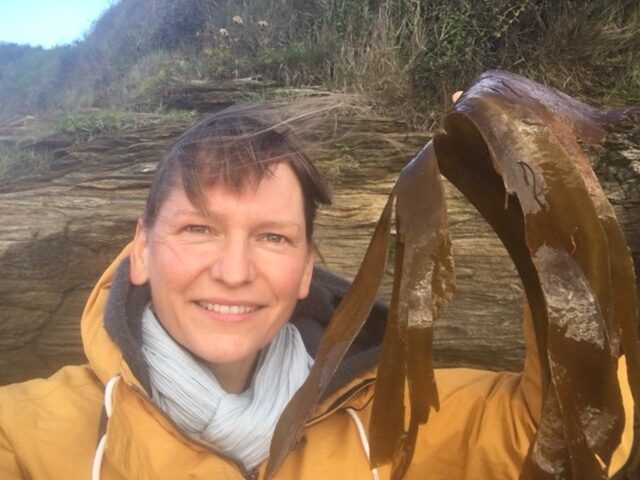Silke Lehmann, molecular plant physiologist, working on algal extracts to enhance crop growth

Silke Lehmann is a molecular plant physiologist working on plants responses to environmental stresses at the molecular level. She has begun in October 2021 her research project at the LBCM Vannes (University of South Brittany)
[Team BIENVENÜE] How did you become interested in your current research field?
[Silke Lehmann] Plants have always impressed me with their adaptability. I would like to understand how plants sense the outside world and then process this information to cope with the changes they face. At the molecular level, this involves a jungle of biochemical elements and it’s great to find new links between some of them. As a molecular plant physiologist, I’m interested in responses to environmental stresses like drought or pathogens.
How did the VASEC project come about?
During a previous project in England I was working with a bioassay to identify secreted fungal proteins that can change plant signalling and at some point I thought about employing this technique to search phytoactive compounds for applied solutions. Seaweed extracts were a prime target for me because they have long been used to improve crop cultures – including in Brittany, but we will only tap their full potential if we understand how they work. Once I had contacted Nathalie Bourgougnon, who now supervises the project at UBS Vannes, she proposed to test enzymes from marine organisms for seaweed extraction. That is how we combined our research interests and backgrounds for the VASEC project.
What is motivating you in your work?
Motivation comes from a general fascination with nature. Last month I went to the beach at low tide and realized how each seaweed ‘picks’ its preferred spot: short submersion time or strong currents, rather growing on rocks – and all that evolved in parallel with equally well adapted snails, worms and of course a variable mixture of microbes, it’s mind-boggling. In the face of lab routine it helps that I like finding practical solutions to answer my scientific questions. Good ideas still need a realistic eye to implement them – which is why I also like to further develop the applied context of my research.
Why did you choose to come in Brittany?
That’s easy: Brittany is a top region for blue biotechnology! For my project I needed scientific support in seaweed extraction, provided by my colleagues at the LBCM, plus the neighbourhood to an industrial sector that is validating marine resources. Few places in Europe offer similarly beneficial conditions. It’s motivating to see how academics and industrial partners here work together on applied solutions.
You have planned a collaboration with a Breton entreprise during your project, Olmix SA.
Although I had the idea to employ the bioassay for the development of plant treatments, my knowledge about this industrial sector, its processes, products and legal regulations is limited. To bridge this gap between idea and application, an advisory partnership with industry is essential. Olmix SA are ideal collaborators for this project because of their expertise in seaweed-based products for agricultural use and their location in Brittany. Such professional advice helps to detail some characteristics required of the algal extracts and to specify conditions a bioassay should meet to be integrated in product development. Olmix SA also agreed to host me for a secondment during which we will test some extracts on crop plants to validate their potential as treatment.
Do you like to share a resource with the curious reader?
Some people think plants are boring because they are organisms that exhibit slow movements and as humans we are often not capable to fully perceive their reactions and changes. The documentary “The Private Life of Plants” (see External links section of the Wikipedia article to watch) by David Attenborough helps to overcome the different time scales we live on and is good entertainment for all ages.
Thank you Silke!
Photo credit: Silke Lehmann